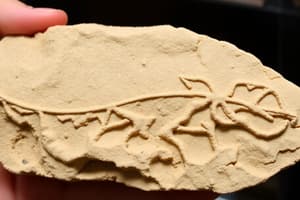Podcast
Questions and Answers
What defines permineralization in fossil preservation?
What defines permineralization in fossil preservation?
- Molds form when the original material dissolves
- Elements in groundwater impregnate all spaces within the body (correct)
- When the original materials are completely preserved
- Organic tissues are compressed and carbon silhouette remains
Which type of preservation involves the formation of molds and casts?
Which type of preservation involves the formation of molds and casts?
- Molds and casts (correct)
- Carbonization
- Trace fossils
- Actual preservation
What is the main focus of ichnology?
What is the main focus of ichnology?
- Analyzing chemical composition of fossils
- Preserving soft tissues in fossils
- Examining prehistoric animal tracks (correct)
- Studying the weight of rock layers
Which of the following describes confining stress in geology?
Which of the following describes confining stress in geology?
What common type of fossil preservation is characterized by the compression of organic tissues?
What common type of fossil preservation is characterized by the compression of organic tissues?
Which fossil type represents indirect evidence left by an organism?
Which fossil type represents indirect evidence left by an organism?
Which technique primarily preserves the original materials of an organism?
Which technique primarily preserves the original materials of an organism?
What type of stress in geology is commonly associated with horizontal forces acting on rocks?
What type of stress in geology is commonly associated with horizontal forces acting on rocks?
What characterizes an angular unconformity?
What characterizes an angular unconformity?
Which method allows for assigning specific time units to mineral grains in rocks?
Which method allows for assigning specific time units to mineral grains in rocks?
What defines a radioactive isotope?
What defines a radioactive isotope?
What is the half-life of the isotope uranium-238?
What is the half-life of the isotope uranium-238?
Which assumption is critical for accurate radioactive dating?
Which assumption is critical for accurate radioactive dating?
How does the half-life of an isotope aid in dating rocks?
How does the half-life of an isotope aid in dating rocks?
What types of rock are most suitable for radioisotopic dating?
What types of rock are most suitable for radioisotopic dating?
What effect can metamorphism have on the dating of rocks?
What effect can metamorphism have on the dating of rocks?
What does the Principle of Superposition state regarding sedimentary strata?
What does the Principle of Superposition state regarding sedimentary strata?
Under the Principle of Original Horizontality, what is the expected orientation of deposited layers?
Under the Principle of Original Horizontality, what is the expected orientation of deposited layers?
What does the Principle of Cross-Cutting Relationships indicate about geological events?
What does the Principle of Cross-Cutting Relationships indicate about geological events?
Which statement accurately describes the Principle of Lateral Continuity?
Which statement accurately describes the Principle of Lateral Continuity?
What does the Principle of Inclusions reveal about rock formations?
What does the Principle of Inclusions reveal about rock formations?
What is an unconformity in geological terms?
What is an unconformity in geological terms?
What characterizes a disconformity?
What characterizes a disconformity?
Which of the following statements is incorrect regarding relative dating principles?
Which of the following statements is incorrect regarding relative dating principles?
Flashcards are hidden until you start studying
Study Notes
Fossils and Evolution
- Fossils are evidence of past life preserved in rocks, including actual remains, impressions, casts, molds, and behavioral evidence like footprints.
- Actual preservation is rare and involves the original materials of organisms being preserved, while soft tissue preservation is even rarer due to decay.
Types of Preservation
- Permineralization: Occurs when buried organisms are impregnated with groundwater minerals, allowing detailed preservation of soft structures, especially bone and teeth.
- Molds and Casts: Molds are cavities formed when the original organism dissolves; casts preserve the external shape if the mold is filled with sediments.
- Carbonization: Involves compression of organic tissues, leaving a carbon silhouette as all volatiles are driven away.
- Trace Fossils: Indirect evidence such as burrows and footprints; ichnology is the study of prehistoric tracks.
Stress in Earth’s Crust
- Stress refers to the force applied per unit area on rocks, impacting geological structures.
- Confining Stress: Occurs when deeply buried rocks are compressed by the weight above.
Relative Dating
- Relative dating determines the chronological order of rocks or events without specific ages.
- Principle of Superposition: In undisturbed layers, older strata are at the bottom, and younger layers are above.
- Principle of Original Horizontality: Rocks are initially deposited horizontally, except in sloping areas.
- Principle of Lateral Continuity: Strata are continuous in all directions until they thin out at basin edges or barriers.
- Principle of Cross-Cutting Relationships: Deforming features (like faults) are younger than the rocks they cut.
- Principle of Inclusions: Inclusion of rock fragments indicates the included rock is older than the host layer.
Unconformities
- Unconformities represent breaks in the geological record due to erosion or pauses in sediment accumulation.
- Disconformity: A break in a parallel sequence of strata.
- Angular Unconformity: Occurs when layers are deposited on tilted or folded strata.
Absolute Dating
- Radioisotopic Dating: Uses the discovery of radioactivity to assign specific age units to mineral grains in rocks.
- Radioactive Isotopes: Unstable isotopes can decay over time, releasing particles or energy.
- Half-life: The time it takes for half of a radioactive substance to decay; crucial for dating rocks.
- Half-life examples include uranium-238 (4.5 billion years) and carbon-14 (5,730 years).
Radioactive Decay Assumptions
- Accurate dating assumes mineral grains formed when the rock did and that they remain a closed system, unaltered by external elements.
- Igneous rocks are best for dating, as metamorphic processes may reset the isotopic clock, complicating age determination.
Studying That Suits You
Use AI to generate personalized quizzes and flashcards to suit your learning preferences.





